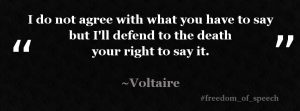This week I spoke to Richard Wilson, director of the Stop Funding Hate campaign. I expected him to be passionately angry, but instead he spoke with perfect diplomacy.

The Stop Funding Hate campaign highlights conflicting values between companies and the papers they advertise in. They’re currently campaigning for the Co-operative to review their advertisements in the Daily Express. The Co-operative are recognised as being ethically-conscious, and even have an “ethics in action” plan to tackle issues such as global poverty and domestic abuse.
The Daily Express, however, “routinely discriminates against refugees, migrants and other minority groups“. Mr Wilson has identified this “mismatch” of values and argues that a recognised ethical brand should “apply the same ethical measures to other aspects” of the company.

The SFH campaign brought this issue to the attention of the Co-op customers, who indirectly fund the Daily Express, to give them a platform to voice their opinions. As a result, Co-op are currently “reviewing their advertising policies”.
What provoked him to start the SFH campaign?
Richard’s mother worked with refugees, so from a young age he has always recognised the “ongoing abuse of particular groups, particularly Muslims and Eastern Europeans”.
He described his long-term awareness of the “negative and slanted stories… targeting groups in a discriminative way” as his underlying reason for starting the campaign. While right-wing people may decry this as being soft or easily-offended, Richard explains that the “cumulative effect of all the negativity could be harmful in real people’s lives”. This problem goes beyond political correctness and hurt feelings. He references the correlation between heightened negative coverage of minority groups and the rise in hate crimes. The press are inciting racial hatred through the unrelenting barrage of non-white condemnation.
An article in the Sun (below) described the Syrian refugees as ‘cockroaches’, Richard identified the similarity between this reference, and the language used to instigate the genocide in Rwanda. Despite his awareness of negativity in the media, he was shocked to see the UN’s criticism of the demonisation in the news. He described this as a “wake up call”, realising that this “goes beyond domestic politics and can lead to human rights abuses”.
Shame on @TheSunNewspaper Katie Hopkins calls migrants cockroaches / for use of gunboats on then in the Med #olsx pic.twitter.com/DNzvrquIUp
— Denis Fernando (@redcablesunday) April 18, 2015
What does the campaign hope to achieve ultimately?
Richard claims that the campaign is “realistic and effective” with the potential to “lead to significant change”, including a “free, independent, fair press”. The ultimate goal of the campaign is to ensure that discrimination against groups of people is “no longer a good way of making money” due to the “financial incentive to produce negative stories”. Richard explains that the campaign is specifically raising awareness about divisive language used in the Sun, the Daily Mail and the Express. He says that these news outlets have been “called out by the UN” and that they are not setting a very high threshold as to what they deem acceptable.
But we don’t believe everything we are told…
I explained to Richard that because I’ve learnt about spin doctors and agenda-setting, that I can see past the discriminatory news whereas other readers may take it at face-value. But he disagreed, he argued that “everyone is influenced by what they see and hear around them. We shouldn’t demonise the readers because we are all susceptible to influence. Even as a member of the community, it makes you afraid”. And yes, I realised this is accurate. After being bombarded with the same messages, I did find myself sliding towards the right. Despite agreeing more often with the left-wing stance, I often did start to wonder if I was wrong, because some right-wing spokespeople can be so convincing and so certain. He said that this is because “messages on facebook pages are repeated through the broadcasters – that’s how the influence works”. So because the news are reflecting the public ideologies of violent/criminal groups, it’s as though the broadcasters are confirming the public anxiety as fact, which seems to legitimise negative stereotypes and xenophobia.
How much effect can words have?
While we should celebrate free speech and respect different perspectives, there are limitations on what is acceptable. Richard informed me about TellMAMA (Measuring Anti-Muslim Attacks) data that showed “spikes in hate crimes following anti-Muslim stories, there is a causal link between the tone of the stories and perception. We have to take notice of the data”.
Richard explains that history has proven that media can influence us to this extent – discriminatory language is the first step in this direction. He referred to the propaganda on the Rwandan radio that led to the genocide against the Tutsi and that of World War II Germany by the Nazi’s. He says that the messages we see in the media don’t consist solely of factual statements but also exude “fear and distrust”. As members of the community, we develop a “nagging doubt”. Some may be more resistant to this doubt, depending on their political stance, while others may embrace it.
Are we witnessing a rise of far-right politics?
Social media and tabloid news outlets are fuelling far-right beliefs and creating a platform for intolerance to shine. Richard says that there “seems to be an increase of hateful rhetoric throughout society, a lot of anger, a lot of rage”. But he suggests that this is balanced, “It’s not to do with left or right, it’s across the spectrum. It manifests in far-left and far-right ideologies, so we are seeing a rise in political extremism which again leads to a rise in demonising rhetoric”.
“The Spectator described your campaign as “a stab at censorship, not a cry for tolerance” and claimed that journalists would be forced to stop expressing themselves. Do you think that your campaign places restrictions on free-speech?”
“We’re pro free-speech. We’re allowing a space for people who are unhappy to express their views.” The SFH campaign “does not call for government intervention” so it is not removing anybody’s rights, rather, it is enabling a discussion between two sides.

SFH is concerned with the link between people spending money in places such as John Lewis, who are then using this money to fund discriminatory news outlets through advertising. “People have a right to speak out”. He argues that they are not fighting against freedom of expression, but highlights the fact that unaware customers should not have to subsidise these papers. “They’re not being locked up or subject to sanctions – it’s not a political issue but an ethical one”.
“We aren’t interested in political affiliation. We don’t want to see our neighbours targeted. It’s an issue of common decency and human respect”.
Leave a Reply